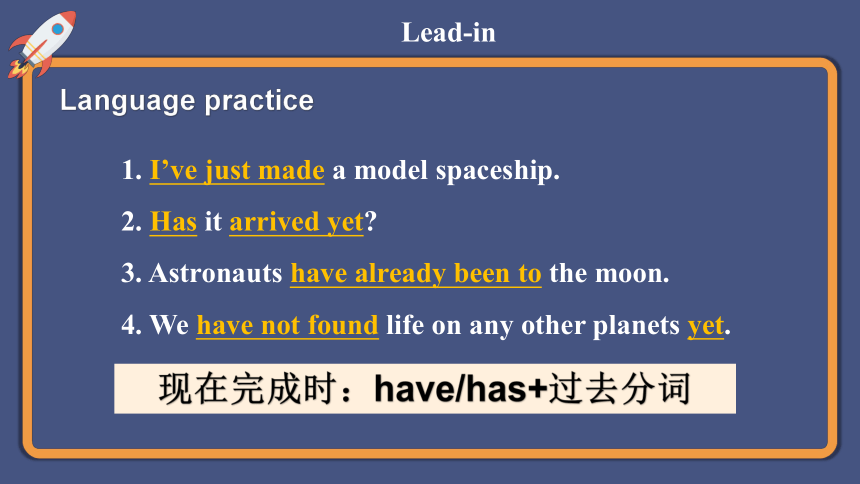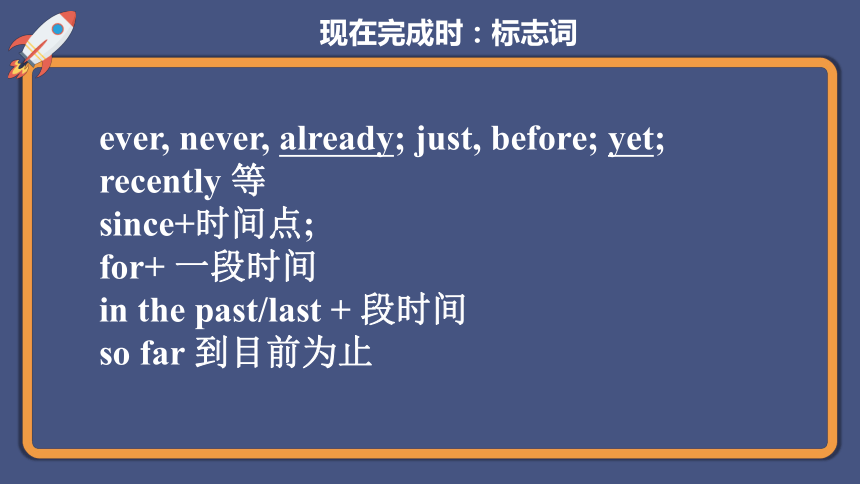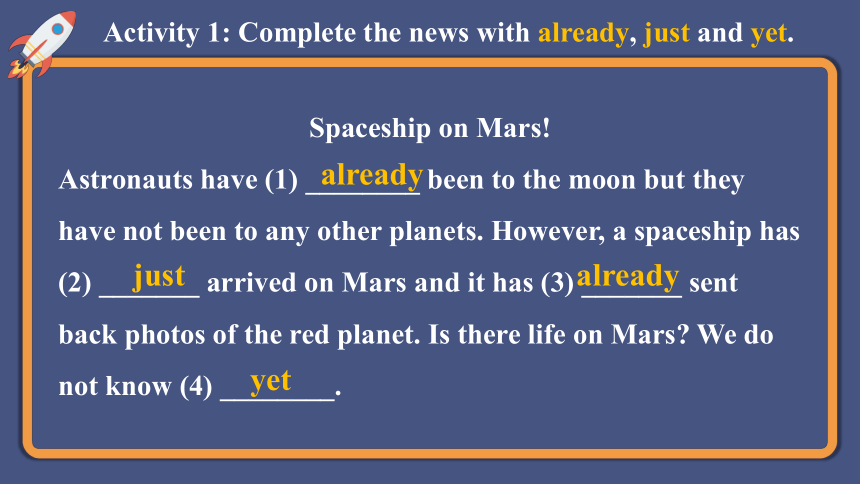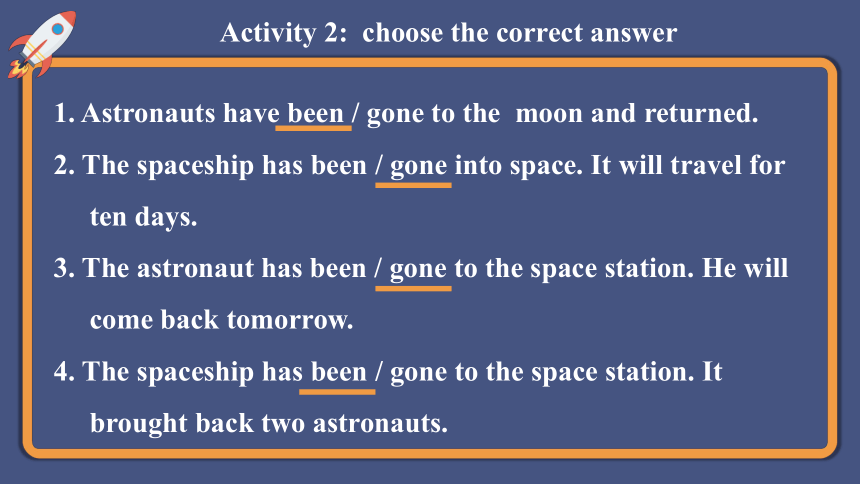2023-2024学年度外研版八下Module 3 Journey to space Unit 3 Language in use-课件(共19张PPT)
文档属性
| 名称 | 2023-2024学年度外研版八下Module 3 Journey to space Unit 3 Language in use-课件(共19张PPT) |

|
|
| 格式 | pptx | ||
| 文件大小 | 1.5MB | ||
| 资源类型 | 教案 | ||
| 版本资源 | 外研版 | ||
| 科目 | 英语 | ||
| 更新时间 | 2024-03-20 07:02:55 | ||
图片预览







文档简介
(共19张PPT)
Module 3
Journey to space
Unit 3
Language in use
Lead-in
Language practice
1. I’ve just made a model spaceship.
2. Has it arrived yet
3. Astronauts have already been to the moon.
4. We have not found life on any other planets yet.
现在完成时:have/has+过去分词
现在完成时
基本结构
have / has + done
助动词 (可以帮助构成肯定、疑问和否定句)
现在完成时:标志词
ever, never, already; just, before; yet; recently 等
since+时间点;
for+ 一段时间
in the past/last + 段时间
so far 到目前为止
现在完成时:标志词
用never, ever, already, just, yet, for, since填空
1. I have ____________ seen him before, so I have no idea about him.
2. Jack has _________ finished his homework.
3. Mr. Wang has taught in this school ________ ten years.
4. “Have you _____________ seen the film ”
“No, I have _____________ seen it.”
5. “Has the bus left ____________ ”
“Yes, it has ______________ left.”
never
just
for
ever
never
yet
already
Activity 1: Complete the news with already, just and yet.
Spaceship on Mars!
Astronauts have (1) ________ been to the moon but they have not been to any other planets. However, a spaceship has (2) _______ arrived on Mars and it has (3) _______ sent back photos of the red planet. Is there life on Mars We do not know (4) ________.
already
just
already
yet
Activity 2: choose the correct answer
1. Astronauts have been / gone to the moon and returned.
2. The spaceship has been / gone into space. It will travel for
ten days.
3. The astronaut has been / gone to the space station. He will
come back tomorrow.
4. The spaceship has been / gone to the space station. It
brought back two astronauts.
Activity 3: Complete the sentences
1. A spaceship ____________ to Mars. It is coming back to the earth next year.
2. Lots of astronauts ___________ to the space station. They found it very interesting.
3. Some astronauts ____________ to the moon twice.
4. Two British astronauts__________ to the space station.
They will come back in January.
has gone
have been
have been
have gone
Activity 4: Complete the conversation
Nicky: I’ve just (1) ________ (watch) a great TV programme about space. Did you know that scientists have (2) __________
(discover) water on Mars
Bill: Yes, I did. And scientists (3) __________ (try) to find life on Mars now.
Nicky: Yes, they’re looking for life but they (4) ____________ (not find) anything yet.
Bill: There were some new photos of Mars in the newspaper
today. (5) _______ you ______ (see) them yet
Nicky: Yes. They’re amazing!
watched
discovered
are trying
haven’t found
Have seen
Activity 5: Work in pairs.
Activity 6: Complete the email
FROM: Liu Dan
TO: Li Fang
SUBJECT: I’ve found a great book.
Dear Li Fang,
I’ve (1) ________ finished reading a great book at school. I haven’t (2) ________ anything as good as that for a long time! It’s a story about the solar system. In the book, the writer imagines that astronauts have (3) _______ to Mars. I’ve (4) ________ thought about that before and I think it’s very interesting.
just
read
been
never
Activity 6: Complete the email
I haven’t (5) _______ anyone famous in my life but I hope one day I can meet an astronaut. I’ve (6) ________ to a Chinese astronaut for more information about space and his experience of space travel. I hope he will write back. He hasn’t (7) _______. Maybe he is too busy. I’m still waiting.
Best wishes,
Liu Dan
met
written
yet
Activity 7: Listen and complete the notes.
1. The astronaut joined CNSA _________ years ago.
2. He has flown in a spaceship ________ times.
3. He felt __________ when he was in the spaceship.
4. He has been to the space station _________.
5. The earth was blue and very ___________ when he saw it from the space station.
6. He decided to be an astronaut because he has always been __________ in space.
six
two
excited
twice
beautiful
interested
Activity 8: Complete the word map
solar system
space
space travel
Mars
the
moon
the
earth
the
sun
space, spaceship,
astronaut
Activity 9: Listen and complete the notes.
In July 1969, Neil Armstrong became the first (1) __________ to walk on the (2) ___________. People all around the world watched their television sand waited for the (3) ________ to
(4) ________ the earth. We have now (5) __________ a lot more about our solar system, and we have sent (6) __________ to Mars, but no one has walked on that planet (7) ________. But I believe one day someone will!
astronaut
moon
news
reach
discovered
spaceships
yet
Around the world
Many European languages use the names of the heavenly bodies for the days of the week. For example, in English, Saturday is named after the planet Saturn, the sixth planet from the sun. Sunday is the day of the sun, a traditional day of rest. Monday gets its name from the moon and is the day of the moon.
Names of the days of the week
Around the world
Names of the days of the week
Sunday(星期日):这是一周中的第一天。太阳(sun)在北欧人的心目中是极其神圣的。为了表示对太阳的敬仰,人们把每周的第一天命名为Sunday。
Monday(星期一):这是一周中的第二天。为了表达对月亮(moon)的敬仰,人们把这一天称作moon day,后来演变为Monday。
Tuesday(星晴二):这是一周中的第三天。北欧神话里有一个战神叫做Tyr,他机智勇敢,守护人类的平安。为了纪念他,英语中就以他的名字命名为星期二。
Around the world
Names of the days of the week
Wednesday(星期三):是以北欧神话中的主神Woden的名字命名的。Woden是北欧神话中掌管文化、艺术、战争等的最高神。
Thursday(星期四):是以北欧神话中的雷神Thor的名字命名的。Thor是北欧神话中最强大、最勇敢的神,是雷电之神。
Friday(星期五):是以爱神的名字命名的。北欧神话中的爱神、婚姻女神叫做Frigga,相当于罗马神话中的“维纳斯”。
Saturday(星期六):这是一周中的第七天。它是以罗马的农神Saturn的名字命名的。因此是“农神日”,是唯一保留罗马名称的一天。
THANKS
Module 3
Journey to space
Unit 3
Language in use
Lead-in
Language practice
1. I’ve just made a model spaceship.
2. Has it arrived yet
3. Astronauts have already been to the moon.
4. We have not found life on any other planets yet.
现在完成时:have/has+过去分词
现在完成时
基本结构
have / has + done
助动词 (可以帮助构成肯定、疑问和否定句)
现在完成时:标志词
ever, never, already; just, before; yet; recently 等
since+时间点;
for+ 一段时间
in the past/last + 段时间
so far 到目前为止
现在完成时:标志词
用never, ever, already, just, yet, for, since填空
1. I have ____________ seen him before, so I have no idea about him.
2. Jack has _________ finished his homework.
3. Mr. Wang has taught in this school ________ ten years.
4. “Have you _____________ seen the film ”
“No, I have _____________ seen it.”
5. “Has the bus left ____________ ”
“Yes, it has ______________ left.”
never
just
for
ever
never
yet
already
Activity 1: Complete the news with already, just and yet.
Spaceship on Mars!
Astronauts have (1) ________ been to the moon but they have not been to any other planets. However, a spaceship has (2) _______ arrived on Mars and it has (3) _______ sent back photos of the red planet. Is there life on Mars We do not know (4) ________.
already
just
already
yet
Activity 2: choose the correct answer
1. Astronauts have been / gone to the moon and returned.
2. The spaceship has been / gone into space. It will travel for
ten days.
3. The astronaut has been / gone to the space station. He will
come back tomorrow.
4. The spaceship has been / gone to the space station. It
brought back two astronauts.
Activity 3: Complete the sentences
1. A spaceship ____________ to Mars. It is coming back to the earth next year.
2. Lots of astronauts ___________ to the space station. They found it very interesting.
3. Some astronauts ____________ to the moon twice.
4. Two British astronauts__________ to the space station.
They will come back in January.
has gone
have been
have been
have gone
Activity 4: Complete the conversation
Nicky: I’ve just (1) ________ (watch) a great TV programme about space. Did you know that scientists have (2) __________
(discover) water on Mars
Bill: Yes, I did. And scientists (3) __________ (try) to find life on Mars now.
Nicky: Yes, they’re looking for life but they (4) ____________ (not find) anything yet.
Bill: There were some new photos of Mars in the newspaper
today. (5) _______ you ______ (see) them yet
Nicky: Yes. They’re amazing!
watched
discovered
are trying
haven’t found
Have seen
Activity 5: Work in pairs.
Activity 6: Complete the email
FROM: Liu Dan
TO: Li Fang
SUBJECT: I’ve found a great book.
Dear Li Fang,
I’ve (1) ________ finished reading a great book at school. I haven’t (2) ________ anything as good as that for a long time! It’s a story about the solar system. In the book, the writer imagines that astronauts have (3) _______ to Mars. I’ve (4) ________ thought about that before and I think it’s very interesting.
just
read
been
never
Activity 6: Complete the email
I haven’t (5) _______ anyone famous in my life but I hope one day I can meet an astronaut. I’ve (6) ________ to a Chinese astronaut for more information about space and his experience of space travel. I hope he will write back. He hasn’t (7) _______. Maybe he is too busy. I’m still waiting.
Best wishes,
Liu Dan
met
written
yet
Activity 7: Listen and complete the notes.
1. The astronaut joined CNSA _________ years ago.
2. He has flown in a spaceship ________ times.
3. He felt __________ when he was in the spaceship.
4. He has been to the space station _________.
5. The earth was blue and very ___________ when he saw it from the space station.
6. He decided to be an astronaut because he has always been __________ in space.
six
two
excited
twice
beautiful
interested
Activity 8: Complete the word map
solar system
space
space travel
Mars
the
moon
the
earth
the
sun
space, spaceship,
astronaut
Activity 9: Listen and complete the notes.
In July 1969, Neil Armstrong became the first (1) __________ to walk on the (2) ___________. People all around the world watched their television sand waited for the (3) ________ to
(4) ________ the earth. We have now (5) __________ a lot more about our solar system, and we have sent (6) __________ to Mars, but no one has walked on that planet (7) ________. But I believe one day someone will!
astronaut
moon
news
reach
discovered
spaceships
yet
Around the world
Many European languages use the names of the heavenly bodies for the days of the week. For example, in English, Saturday is named after the planet Saturn, the sixth planet from the sun. Sunday is the day of the sun, a traditional day of rest. Monday gets its name from the moon and is the day of the moon.
Names of the days of the week
Around the world
Names of the days of the week
Sunday(星期日):这是一周中的第一天。太阳(sun)在北欧人的心目中是极其神圣的。为了表示对太阳的敬仰,人们把每周的第一天命名为Sunday。
Monday(星期一):这是一周中的第二天。为了表达对月亮(moon)的敬仰,人们把这一天称作moon day,后来演变为Monday。
Tuesday(星晴二):这是一周中的第三天。北欧神话里有一个战神叫做Tyr,他机智勇敢,守护人类的平安。为了纪念他,英语中就以他的名字命名为星期二。
Around the world
Names of the days of the week
Wednesday(星期三):是以北欧神话中的主神Woden的名字命名的。Woden是北欧神话中掌管文化、艺术、战争等的最高神。
Thursday(星期四):是以北欧神话中的雷神Thor的名字命名的。Thor是北欧神话中最强大、最勇敢的神,是雷电之神。
Friday(星期五):是以爱神的名字命名的。北欧神话中的爱神、婚姻女神叫做Frigga,相当于罗马神话中的“维纳斯”。
Saturday(星期六):这是一周中的第七天。它是以罗马的农神Saturn的名字命名的。因此是“农神日”,是唯一保留罗马名称的一天。
THANKS
同课章节目录
- Module 1 Feelings and impressions
- Unit 1 It smells delicious.
- Unit 2 I feel nervous when I speak Chinese .
- Unit 3 Language in use
- Module 2 Experiences
- Unit 1 I've also entered lots of speaking competi
- Unit 2 They have seen the Pyramids.
- Unit 3 Language in use
- Module 3 Journey to space
- Unit 1 Has it arrived yet?
- Unit 2 We have not found life on any other planet
- Unit 3 Language in use
- Module 4 Seeing the docto
- Unit 1 I haven't done much exercise since I got m
- Unit 2 We have played football for a year now
- Unit 3 Language in use
- Module 5 Cartoons
- Unit 1 It's time to watch a cartoon.
- Unit 2 Tintin has been popular for over eighty yea
- Unit 3 Language in use
- Revision module A
- Module 6 Hobbies
- Unit 1 Do you collect anything ?
- Unit 2 Hobbies can make you grow as a person.
- Unit 3 Language in use
- Module 7 Summer in Los Angeles
- Unit 1 Please write to me and send me some photos
- Unit 2 Fill out a form and come to learn English
- Unit 3 Language in use
- Module 8 Time off
- Unit 1 I can hardly believe we are in the city ce
- Unit 2 We thought somebody was moving about
- Unit 3 Language in use
- Module 9 Friendship
- Unit 1 Could I ask if you've mentioned this to he
- Unit 2 I believe that the world is what you think
- Unit 3 Language in use
- Module 10 On the radio
- Unit 1 I hope that you can join us one day
- Unit 2 It seemed that they were speaking to me in
- Unit 3 Language in use
- Revision module B
